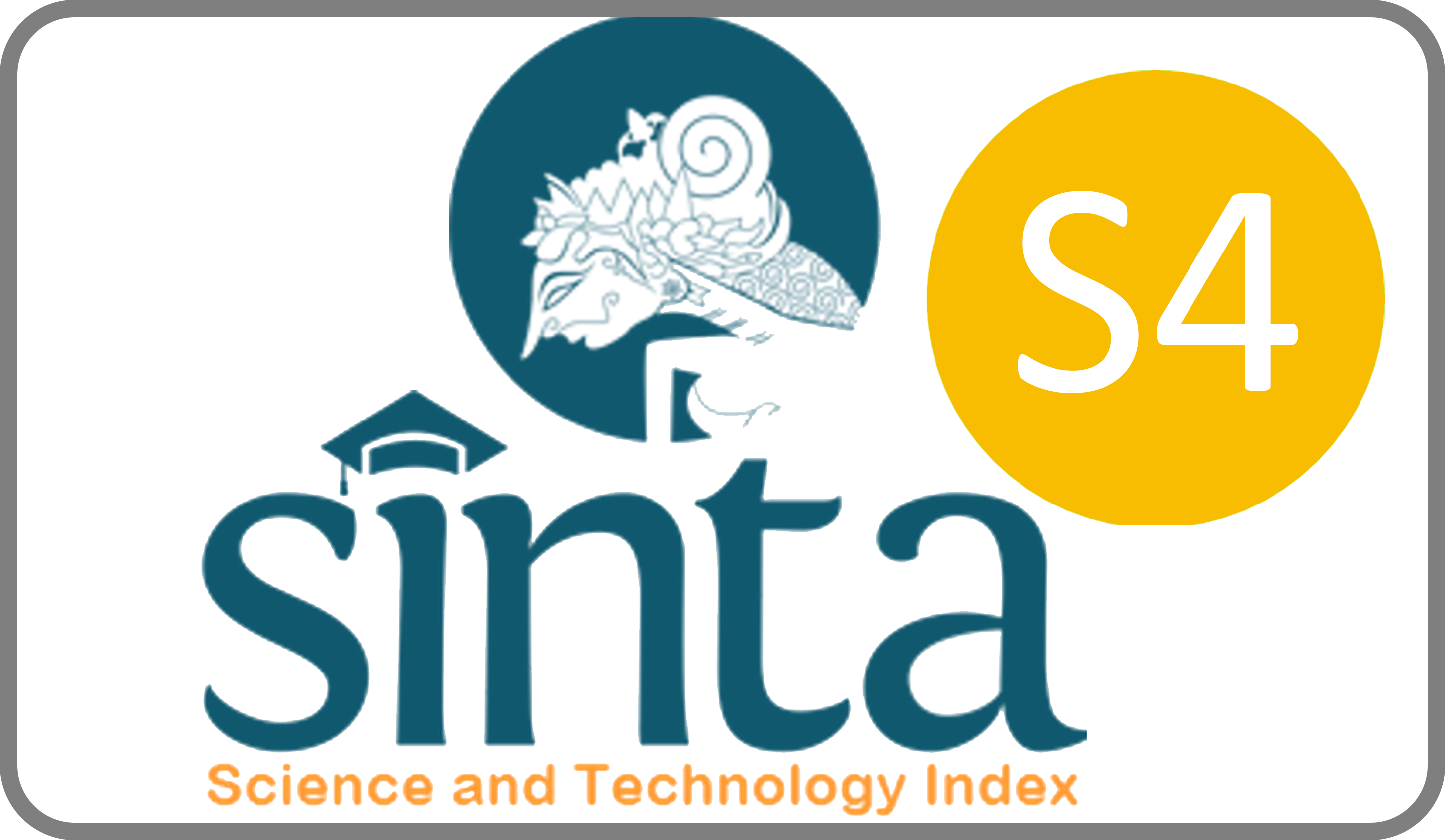PANDUAN AMAN "NEW NORMAL” MENGHADAPI PANDEMI COVID-19
Downloads
In the midst of ongoing pandemic and the start of New Normal, the community is required to comply with health protocols when doing their daily activities. This will changes almost all aspects and order in society so that adaptation is needed. Many people feel burdened because it will limit themselves to show off, to develop skills, and even limiting their income. Therefore, they refuse to follow protocols and assume New Normal means returning back to normal. Community perspective on the understanding of New Normal and how to adapt which is sometimes not appropriate will make it difficult to prevent the spread of COVID-19. Therefore, we held a Community Service Program in the form of WEBINAR, online seminar education which is practical and doesn't need to gather people crowds. This WEBINAR aims to revise people's perspectives on New Normal and to give the correct adaptation methods. Moreover, this WEBINAR is also about ways to develop themselves and create innovations during this pandemic, given there are social, communication, and transportation restriction. The WEBINAR was held online using the Zoom meeting platform and was held on June 18th 2020 at 19.00 WIB with the speaker namely Ms. Ayu Tarantika Indreswari, S.Farm., Apt. The WEBINAR was attended by more than 100 participants from various cities and was dominated by teenagers. The goals of the following WEBINAR is increase the understanding and awareness of the community in implementing New Normal without limiting it to still look beautiful, stay healthy, and still earn a living. Of course, the correct adaptation of New Normal will help prevent the spread of COVID-19.
abstrak
Di tengah masa pandemi yang masih berlangsung dan dimulainya New Normal, masyarakat dituntut untuk tetap mematuhi protokol kesehatan dalam beraktivitas sehari-hari. Hal ini mengubah hampir sebagian aspek dan tatanan dalam masyarakat sehingga adaptasi sangat diperlukan. Banyak dari masyarakat yang merasa terbebani akan hal itu karena akan membatasi mereka dalam menampilkan diri, mengembangkan bakat, dan bahkan membatasi penghasilan mereka. Sehingga dengan berbagai alasan tersebut mereka menolak mengikuti protokol New Normal dan menganggap New Normal berarti kembali seperti normal. Perspektif masyarakat mengenai pengertian New Normal dan cara menerapkannya yang terkadang belum tepat akan menyulitkan upaya pencegahan penyebaran kasus COVID-19. Oleh karena itu, kami mengadakan program KKN berupa WEBINAR, seminar edukasi daring yang praktis tanpa harus mengumpulkan kerumunan orang di lapangan. WEBINAR ini bertujuan untuk meluruskan perspektif masyarakat mengenai New normal dan cara adaptasi yang benar. Selain itu, WEBINAR ini juga mengenai cara untuk mengembangkan diri dan menciptakan inovasi di masa pandemi, menghingat terdapat pembatasan sosial, komunikasi, dan transportasi. WEBINAR diadakan secara daring dengan menggunakan platform meeting Zoom dan dilaksanakan pda tanggal 18 Juni 2020 pukul 19.00 WIB dengan pemateri yaitu Kak Ayu Tarantika Indreswari., S.Farm., Apt. WEBINAR diikuti 118 peserta dari berbagai kota, dan didominasi oleh remaja. Diharapkan dengan adanya WEBINAR berikut, akan meningkatkan pemahaman dan kesadaran masyarakat dalam menerapkan New Normal tanpa membatasi untuk tetap tampil cantik, tetap sehat, dan tetap berinovasi. Tentunya, penerapan New Normal yang benar akan membantu mencegah penyebaran COVID-19.
Andriani, H. (2020). Effectiveness of Large-Scale Social Restrictions ( PSBB ) toward the New Normal Era during COVID-19 Outbreak : a Mini Policy Review. 5(2), 61–65.
Dinas Kesehatan Provinsi Jawa Timur. 2020. Radar COVID-19 Jawa Timur. https://radarCOVID19.jatimprov.go.id/ (Diakses pada 24 Juli 2020)
Huang C, Wang Y, Li X, Ren L, Zhao J, Hu Y, et al. Clinical features of patients infected with 2019 novel coronavirus in Wuhan, China. Lancet. 2020;395(10223):497-506.
Kementerian Kesehatan Republik Indonesia. Info Infeksi Emerging Kementerian Kesehatan RI [Internet]. 2020 [updated 2020 March 30; cited 2020 March 31]. Available from: https://infeksiemerging.kemkes.go.id/.
Lars, Erik Jonsson. Roger, Saljo. 2010. The Online Seminar as Enacted Practice. IGI Global. Chapter III, 38-39.
Rothan HA, Byrareddy SN. The epidemiology and pathogenesis of coronavirus disease (COVID-19) outbreak. J Autoimmun. 2020; published online March 3. DOI: 10.1016/j.jaut.2020.102433.
Ren L-L, Wang Y-M, Wu Z-Q, Xiang Z-C, Guo L, Xu T, et al. Identification of a novel coronavirus causing severe pneumonia in human: a descriptive study. Chin Med J. 2020; published online February 11. DOI: 10.1097/CM9.0000000000000722.
World Health Organization. Coronavirus disease 2019 (COVID-19) SituationReport – 70 [Internet]. WHO; 2020 [updated 2020 March 30; cited 2020 March31].Available from: https://www.who.int/docs/default-source/coronaviruse/situation-reports/20200330-sitrep-70-COVID-19.pdf?sfvrsn=7e0fe3f8_2
World Health Organization. WHO Director-General's opening remarks at the media briefing on COVID-19 - 11 March 2020 [Internet]. 2020 [updated 2020 March 11]. Available from: https://www.who.int/dg/speeches/detail/who-director-general-s-opening-remarks-at-the-media-briefing-on-COVID-19---11-march-2020.
World Health Organization. Situation Report – 42 [Internet]. 2020 [updated 2020 March 02; cited 2020 March 15]. Available from: https://www.who.int/docs/default-source/coronaviruse/situation-reports/20200302-sitrep-42-COVID-19.pdf?sfvrsn=224c1add_2.
JLM by Unair is licensed under a Creative Commons Attribution-ShareAlike 4.0 International License.
1. The journal allows the author to hold the copyright of the article without restrictions.
2. The journal allows the author(s) to retain publishing rights without restrictions
3. The legal formal aspect of journal publication accessibility refers to Creative Commons Attribution Share-Alike (CC BY-SA).
4. The Creative Commons Attribution Share-Alike (CC BY-SA) license allows re-distribution and re-use of a licensed work on the conditions that the creator is appropriately credited and that any derivative work is made available under "the same, similar or a compatible license”. Other than the conditions mentioned above, the editorial board is not responsible for copyright violation.


















